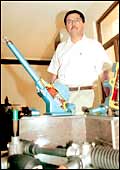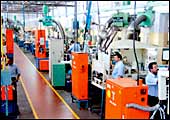|
Barely a year after American quality guru W. Edwards Deming
landed in Japan in 1950 to teach the war-ravaged country how to
use statistical control techniques to make quantum leaps in quality,
the Union of Japanese Scientists and Engineers (JUSE) instituted
an award in his honour. Over the years, the Deming Application
Prize (or simply the Deming Prize) has come to be regarded as
the Nobel Prize for quality. For good reason. It takes years for
a company to bring its quality systems to a level where it will
stand JUSE's scrutiny. It took Sundaram-Clayton, India's first
Deming winner, 10 years of relentless improvements to win the
recognition in 1998. That's one reason why since then, India has
produced only a dozen Deming winners. Says Sarita Nagpal, a quality
counsellor with CII, which first roped in JUSE to help Indian
companies achieve total quality management (TQM): "Quality
is not a hardware issue, but about changing mindsets." The
CEOs who do succeed in changing the organisational mindset are
invariably rewarded by Deming's instant recognition around the
world. Indeed, for India Inc., which must make the Made in India
label globally acceptable, the Deming Prize is nothing short of
a passport to key markets. Yet, winning Deming is not the end
of the road. Rather, it's the beginning of a journey that never
really ends. But, how does one get started on it and then stay
the course? For answers, let's take a look at 2005's Deming winners:
Seating systems manufacturer Krishna Maruti, and Chennai-based
Rane Engine Valves and Rane TRW Steering Systems.
 |
| Krishna Maruti team: Ashok Kapur's (front)
company is the only seat manufacturer in the world to bag
Deming |
Receiving
the deming Prize is always a proud moment, but on November 8,
2005, when Ashok Kapur made his way to the podium at Tokyo's Keidanren
Kaikan (home to Japan's business federation) auditorium, there
was extra spring in his step. His company, Krishna Maruti, was
not just the first car seating company in the world to win the
Deming Prize for Total Quality Management (TQM), but-at 10 years
old-also the youngest company in the world to do so. So, how did
the 59-year-old pull it off? "I didn't. Every brain in the
company contributes to improvements. This includes even gardeners
and sweepers," says Kapur. To make his point, he made sure
that his first worker Ram Pal was part of the team that went to
Tokyo to receive the award.
Set up in 1994, Krishna Maruti embarked on
the TQM journey in 1999 as part of Maruti Udyog's (and CII's)
second "cluster" of vendors chosen for quality improvement.
That was also the time when a lot of multinational car companies
and their suppliers had either just come in or were setting up
shop. Kapur realised that to compete with international players,
his own company would need to manufacture to global standards.
Soon after Krishna Maruti joined the cluster initiative, Kapur
decided that it would make a bid for the Deming Prize. "The
main reason behind setting this goal was that I didn't want my
people to get complacent," says Kapur, alluding to the fact
that his company was already the largest seat manufacturer into
its third year.
Kapur knew that TQM would become a company-wide
culture only if he could get his employees to believe in it and
feel responsible for it. Therefore, he focussed on two broad areas:
Changing mindsets, and discipline. "Quality improvement,
productivity, control over wastage...all this can be done, but
discipline is something you need to embed," says Kapur. Guess
who his first victim was? His own son Sunandan, who was the first
to have his salary cut for arriving late to work. "He probably
thought I was joking," reckons Kapur. The fact that Kapur
was willing to discipline his own son sent a powerful message
across the organisation, and not the least about the seriousness
of the TQM initiative.
To start with, a team of eight senior executives,
headed by executive director of manufacturing Ajay K. Bedi, was
put in place to drive TQM implementation across the seat division.
The eight executives under Bedi were actually heads of various
departments such as finance & accounts, quality, production
& MX (supply chain, etc), maintenance, personnel & administration,
production engineering & R&D, purchase and marketing.
While TQM is a fairly standardised improvement
system and all the eight cluster companies had the advantage of
being advised by a Japanese Sensei from JUSE, Prof. Yoshikasu
Tsuda, the challenge for a Deming aspirant like Krishna Maruti
was to come up with a TQM system that was unique to its own goals
and business realities. To quote from JUSE's Deming FAQ, "For
any company, the shortest way to win the Deming Application Prize
is to manage its business in the most appropriate manner to the
company."
RANE GROUP
Steering Ahead |
 |
| L. Ganesh: Not just inspection
of products, but quality organisation-wide |
For the Chennai-based
Rane Group, it's a Deming hat trick of sorts. Two years after
Rane Brake Linings won the prize, two other group companies-Rane
Engine Valves and Rane trw Steering Systems (its steering
gear division in specific)-have bagged the honour. So, was
it easier for Rane than Krishna Maruti? Yes and no. While
having done it once is a definite advantage, every company-and
every unit within a company-poses unique challenges to the
TQM team. But what helped was the top management's realisation
that to compete in a global marketplace, the group companies
would have to significantly improve their performance. "The
workers lacked involvement, the middle managers were busy
fire-fighting rather than identifying problems and the senior
management lived in isolation," recalls L. Ganesh, Vice
Chairman of the Rane Group.
Just like Krishna
Maruti, Rane began its TQM journey in 1999 amidst concerns
that global competition would make the going tough for the
group. Until then, Rane was top-driven. The CEO would formulate
the strategic plan and the whole group would only implement
it. "But quite often, the CEO would be wrong, but our
functioning style did not encourage questioning," says
Ganesh. Today, the management is decentralised. One of the
first things that Rane did to get started on its TQM initiative
was to enlist the help of Japanese Senseis. Yasutoshi Washio,
himself a winner of the Deming Prize for individuals, was
asked to conduct a workshop on TQM for the top management.
Washio helped clarify what the basic elements of TQM would
be. Among them were customer focus, standardisation of processes,
fact-based decision making, policy deployment to align corporate
goals with employee responsibilities, and total employee
involvement.
An apex team was
set up comprising all the company presidents and total quality
(TQ) coordinators, besides group-wide TQ coordinators. This
team would go to a Rane location every month and spend the
day auditing the work done and charting out future progress.
Soon, improvements began to take place across the two companies.
For instance, a shopfloor worker at Rane Engine Valves suggested
a modification to a Rs 1.8 crore machine that resulted in
productivity going up by 80 per cent. All that the company
had to invest by way of capital in the modification was
a meagre Rs 1.5 lakh. When Vice Chairman Ganesh asked the
worker why he had not suggested the improvement before although
he had been working there for 18 years, the worker simply
said, "Nobody asked me for ideas before".
 |
| Quality@Work: At Rane, it shows |
It was a powerful
wake-up call for the top management, which speeded up activities
in quality circles and discussion groups. "The discussions
may take more time than expected, but the spin-off in terms
of employee ownership is well worth it," says S. Krishna
Kumar, President, Rane TRW. Consider the distance TQM has
allowed Rane TRW to travel in a matter of three years. In
2000-01, customer line rejections were at 1,766 parts per
million (PPM), but in 2004-05, the figure was down to 171.
Ditto, Rane Engine Valves, where the customer rejects dropped
from 1524 PPM to 139 PPM in the same time. Says Ganesh:
"Quality no longer means inspection of products, but
applies to the entire organisation, including the canteen."
Having won the Deming,
Rane isn't about to sit back and relax. Both Rane TRW and
Engine Valves plan to improve their lean manufacturing systems
using the Toyota Production System, which focusses on eliminating
all kinds of wastage (including men, materials and machines).
They also plan to push export sales. Says S. Srinivasan,
President, Rane Engine Valves: "Whatever we do must
eventually translate into money." He needn't worry
on that front. Revenues are clipping at both the companies.
Over the three years, topline at Rane TRW has soared from
Rs 98 crore to Rs 310 crore, and at Engine Valves, from
Rs 106 crore to Rs 165 crore. "We now have improved
team work, energetic and motivated employees and improved
organisation alignment," points out Ganesh. That, in
fact, is the real pay-off for all Deming winners.
-Reported by Nitya Varadarajan
|
Thanks to its small and young team, Krishna
Maruti was able to make dramatic improvements in quality and productivity.
For instance, customer rejection (in parts per million), which
was at 2,250 when the company started on its TPM journey, dropped
to 80 in 2001-02 and further to 3.6 two years later, and now stands
at zero. Similarly, manufacturing cost, which stood at a high
10 per cent of sales in 2000-01, is at just 5 per cent today.
What's remarkable is that the quality and cost improvements came
on the back of higher productivity and reducing manpower. While
one worker made a little more than 10 seat sets a day in 1999-2000,
today the number has jumped to 15. In fact, Krishna Maruti boasts
of a worker nicknamed the Human Robot, who rolls out a staggering
1,300 seat frames in one shift. Earlier, that would take two shifts.
Thrilled as Kapur is at winning the Deming,
he says it would be a mistake to pursue TQM just to win a prize.
He would rather do it because that's what he owes his customers.
"When visitors come to our plant, they must say that it is
one of the best plants they have seen, even if they don't know
that we are Deming company," says Kapur. But he is already
beginning to get attention from international buyers because of
his Deming feat. For instance, when Kapur got the news about Deming
(on October 12), he was in Germany as part of a CII delegation,
and whichever company it visited thereafter wanted to meet the
Deming winner separately.
Kapur says his next target is the Japan Quality
Medal, which is open only to Deming winners. But don't think he
is pitching for bragging rights. It's actually a smart business
move. In order to win the JQM, Krishna Maruti will need to show
quality improvements every year for the next three, when JUSE
auditors will pay another visit. Don't be surprised if the tenacious
Kapur ends up impressing them as well.
-reported by Alokesh Bhattacharyya
|






